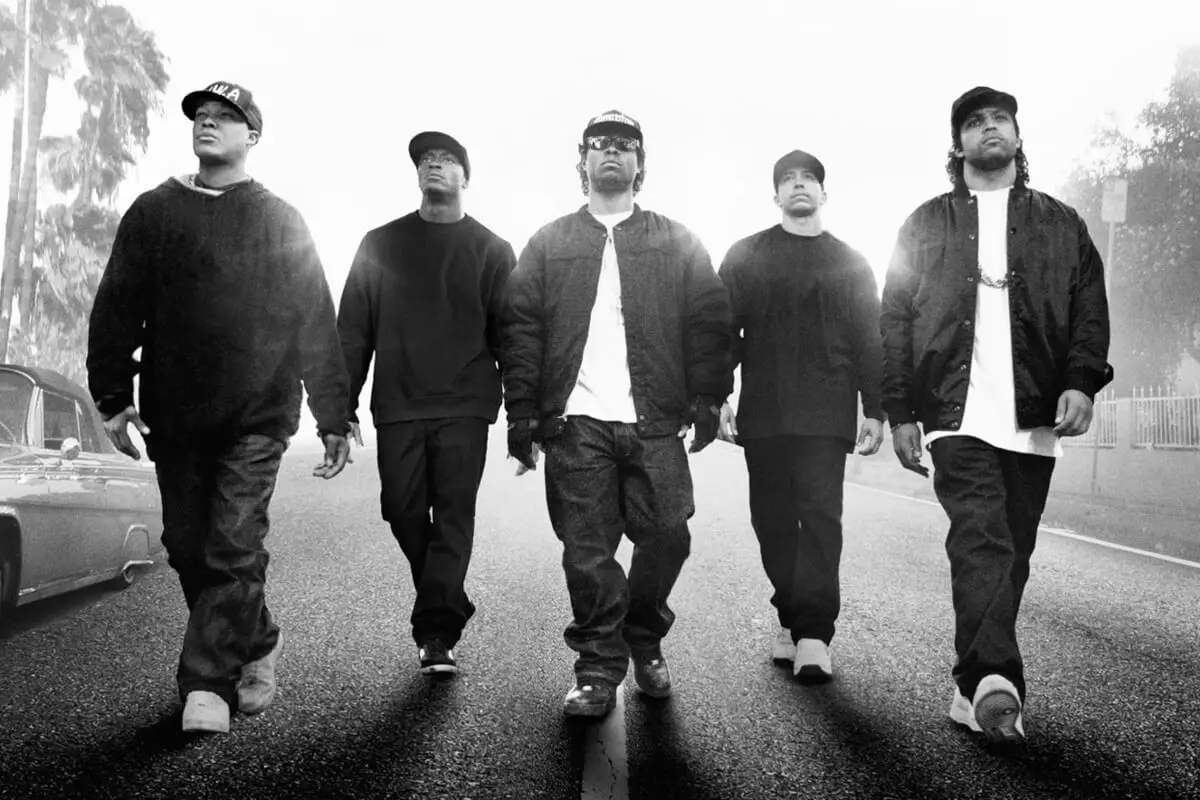Straight Outta Compton

I already knew a little about N.W.A.’s story before sitting down to watch Straight Outta Compton, having recently read Can’t Stop, Won’t Stop: A History Of The Hip-Hop Generation. As I mentioned in my review of that book, hip-hop’s never really carried that much appeal for me – as a white kid from the English suburbs, I have always struggled to relate to much of the lyrical content, as well as the surrounding culture. I do have a great respect for the genre however, and have been challenging myself to learn more about its roots and in particular, those artists that have ‘changed the game’ so to speak. I found that Can’t Stop, Won’t Stop concentrated a little too much on hip-hop’s New York origins, and though it touched upon N.W.A.’s influence, I found its account less than definitive, piquing my interest in learning more about their explosive impact on both music and the wider culture.
So with all signs pointing to Straight Outta Compton, I finally sat down to watch the 2015 biopic, which counted N.W.A. members Ice Cube and Dr. Dre amongst its producers. Drugs, racially-motivated police brutality and threats of gang violence dominated the film’s early scenes, setting the backdrop for the band’s ascent. We’re quickly introduced to N.W.A.’s protagonists – Eazy-E (whose widow also served as a producer), Cube (played by his son, Shea) and Dre – as well as Arabian Prince, DJ Yella and MC Ren, the supporting cast as it were. Exploding onto the national scene, the group soon find themselves mired in controversy due to the uncompromising lyrics of ‘Straight Outta Compton’ and particularly ‘Fuck Tha Police’, and a whole new genre – ‘gangsta rap’ (or ‘reality rap’ as N.W.A. preferred for it to be known) – was born.
What quickly becomes clear to me however is that N.W.A’s early music doesn’t sound particularly hard-hitting`when compared to some of the artists that have followed in the past 20 years – in fact, their sound was quite upbeat and in keeping with the time. However, it’s clear to see why their lyrical content was considered revolutionary given the subject matter, which reflected the lives of young black men both in Compton and all across the country, and tackled (some would argue that it ‘glorified’) subjects that were still considered taboo at the time.
Signing to an independent label (at a time when it was still possible for independent labels to break acts on an industrial scale), N.W.A.’s controversial offensive would even lead to the F.B.I. sending them a now infamous letter of condemnation, and even though the police’s refusal to provide security for the band hurt their plans to tour the country, the refusal of government agencies to work with the band only added to the hype surrounding them. Fittingly, said letter is now on display at The Rock and Roll Hall of Fame, a reflection of its cultural significance.
Straight Outta Compton is of course, just one side of the argument, but history did prove to be on N.W.A.’s side, with the acquittal of each of the four police officers who beat unarmed black man Rodney King leading to public outrage that spilled over into what became known as the ‘LA riots’. Suddenly it was clear to all that what N.W.A. had been saying was true all along, and that their hatred of the police simply mirrored that felt by their peers on the streets all across the city (and beyond).
In fairness, the film does attempt to provide some balance when it comes to picking apart the tensions that would start to plague the band, with infighting between members eventually culminating in N.W.A.’s demise. After Dre loses his brother, causing him to cast blame over N.W.A. for stoking the fires of gang violence in Compton, further friction begins to arise over Eazy-E’s direct dealings with Jerry Heller, the band’s manager, with Ice Cube in particular pushing for clarity over royalties. Whilst Jerry eventually morphs into the film’s chief protagonist, Straight Outta Compton does not always paint Eazy-E in the best light either, but given that the film was produced by his adversaries (at least they were at the time), it’s possible that we need to take some of this picture with a pinch of salt.
Following my favourite part of the film – which illustrates the extremely ‘punk’ moment that the band decided to play ‘Fuck Tha Police’ following an explicit threat not to by law enforcement officers in Detroit – awkward questions at the ensuing press conference over royalty splits push Cube over the edge, and having decided enough is enough he takes the decision to quit N.W.A. and go solo. Straight Outta Compton then deals with the fallout surrounding the release of various diss tracks by both Cube and N.W.A., in which they take aim at one another, and the subsequent accusations of homophobia and anti-semitism that are levelled against the former as a result of his depictions of his former bandmates and their relationship with Jerry. Similar claims would continue to haunt him for a while after, in part due to his controversial affiliation with Nation Of Islam.
However, it wouldn’t be long before Dre would follow Cube out the door, opting to sign with Suge Knight and The D.O.C. – founders of the legendary Death Row Records – following the release of N.W.A.’s second album, which was widely commended for Dre’s production work above all else, and heralded a new sound that would come to be known as ‘Gangsta-Funk’. Suge and The D.O.C.’s portrayal suggests that the members of N.W.A. including Dr. Dre wanted to make a point with Straight Outta Compton that those around them did not always have the group’s best interests at heart but at times the film feels like it veers a little off course in an attempt to settle scores and ensure that history is written in favour of those involved in its production.
Following Dre’s departure, N.W.A. disintegrates, with much of the blame laid at Eazy-E and particularly Jerry’s feet. It doesn’t take long before a reconciliation is on the cards however, but a N.W.A. reunion never comes to pass due to Eazy-E’s sad and untimely death from AIDS. We’ll never know how this second coming would have played out, but what’s for certain is that N.W.A.’s legacy is cemented in stone regardless. The end credits make that abundantly clear, rolling out real footage of the group and the artists they influenced – Tupac, Snoop Dogg, Eminem etc. – accompanied by their music. This is interspersed with footage from Ice Cube’s acting career as well as numerous clippings lauding Apple’s deal for Dr. Dre’s ‘Beats’ brand – the biggest in their history. These serve as a reminder of N.W.A.’s legacy and ongoing cultural influence and it’s clear that neither Dre nor Cube has suffered as a result of N.W.A.’s ongoing hiatus.
On the whole then, Straight Outta Compton is an excellent addition to the recent canon of musical biopics that have been released in recent years. It packs enough of a punch to make it a worthwhile watch regardless of your interest in N.W.A. and / or hip-hop music generally, although an appreciation for storytelling around music and culture does help. The music industry geek inside of me particularly enjoyed watching depictions of the band members in the studio and, as other reviews of the film pointed out around the time of its release, recreations of their live performances are the film’s real highlight. Whilst it’s not a totally comprehensive retelling of N.W.A.’s story (it does not appropriately address all of the issues that dogged the group and its members, such as accusations of homophobia, misogyny and violence against women), it’s one that has rightly captured the attention of a new generation of fans, most of whom have been able to separate the good from the band when it comes to N.W.A. – for better or for worse.


